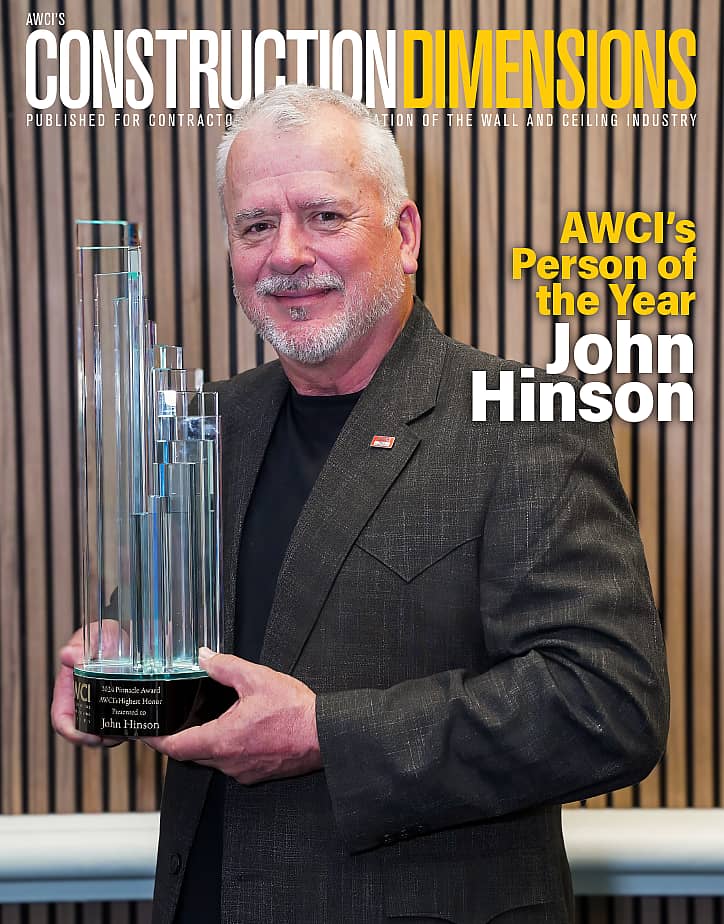Are you getting enough sleep? How about your crews? Sleep disturbances are a major health challenge, news reports say. Sleep debt makes it harder to maintain focus, attention and vigilance on the job, the National Center for Biotechnology Information says. And it doesn’t take much to get off track.
A September 2022 National Institutes of Health study published in the “Journal of Experimental Medicine” found that adults who cut back on sleep by just 1.5 hours a night—from 7.5 to 6 hours over six weeks—had increased inflammation markers and negative impacts on their immune systems. Sound pollution, toxins and high temperatures at night also increase the risk of sleep disturbances.
What can wall-and-ceiling companies do to help their crews be better rested? To answer that question, let’s consider what some truckers do to get restful sleep. Let’s also review a recent study that correlates work pressures with sleep quality.
Set Biocompatible Schedules
Some trucking companies are establishing “biocompatible schedules” for their drivers. Simply put, they’re prioritizing the need for rest ahead of delivery times. They’re making sleep a priority through education.
“Well-rested drivers make about 10% more miles per week if they’re taught how to sleep,” says Dean Croke, principal analyst at DAT Freight & Analytics, in a FastCompany article.
Here’s what workers should know about sleep: After drifting off, the brain enters a phase of deep restorative sleep that lasts 30 to 75 minutes. This deep sleep puts the body through a repair cycle, bolstering the immune system. After deep sleep comes a dream and rapid eye movement. The total cycle—deep sleep and REM—lasts 90 minutes and then repeats, “Psychology Today” says. A good night’s sleep has at least five back-to-back 90-minute cycles.
The sleep hack for truckers involves the 90-minute cycle. A trucker can sleep, say, for two 90-minute cycles, wake up to fulfill a delivery, then head back to bed for more 90-minute sleep cycles, so long as the total cycles add to 7.5 hours for the day. While it’s always better to sleep continuously for 7.5 hours, a trucker could break up his sleep into 90-minute blocks if a delivery schedule requires it.
“I teach drivers to sleep in blocks of an hour and a half,” Croke says. “Seven hours of sleep is worse than six hours sleep because seven is not a multiple of an hour and a half.”
Now, let me be clear. I’m not saying your carpenters can come to work on just three hours of sleep—a multiple of 90 minutes—and work safely and effectively. But knowing that the body works in 90-minute cycles can help them to plan their bedtimes so as to allot a minimum 7.5 hours for sleep. They can flip sleep deprivation on its head if they understand how sleep works. They can also use their days off to catch up on sleep and reverse sleep debt. “Psychology Today” says 15- to 20-minute naps also help to recover quickly from fatigue. The book “Power Sleep” by James B. Maas says employers “can maximize productivity” by providing areas for napping on the job. Your call.
Provide Coping Resources
Stress has a big impact on how well we sleep. This begs the question: How much responsibility and bandwidth do you place on your people? Too much can be detrimental.
A six-year prospective study of sleep—the largest of its kind, the authors say—found that companies can do much to destress their workers and boost their sleep quality. The study of 4,169 Chinese petroleum workers—published in “Sleep,” Volume 44, Issue 8 (August 2021)—identified key stressors that can trigger sleep debt. They include “high role overload, increased responsibility, enhanced physical environment stressors, reduced self-care and reduced rational coping,” the authors say.
The solution? Companies must provide “coping resources” to help workers decompress. Such resources include “rational and problem-focused coping strategies,” the researchers say. They note that “decreased coping resources” correlates with a high incidence of disturbances in sleep. So, your HR department can and should play a role here.
I suggest that soon you review what your company is doing to provide sleep education and to reduce the load placed on all employees. Be sure you have resources in place to help team members feel empowered, get answers to problems and have a listening ear when needed. Let’s get proper rest this year.
Mark L. Johnson writes for the wall and ceiling industry. He can be reached via linkedin.com/in/markjohnsoncommunications.



